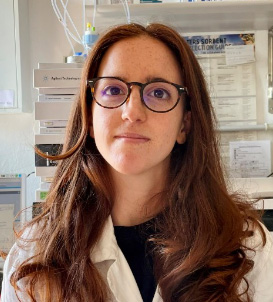
Panel discussion on...
Cognitive health
Welcome in the world of alternative meat: analytical challenges and perspectives

PsyCoMed: Bridging Mental Health and Environmental Challenges
The Mediterranean region is not only ecologically diverse but also home to dynamic societies shaped by history, culture, and industry. However, this very industrialization has made it especially vulnerable to chemical contamination, creating a pressing need for sustainable solutions. Industrial pollution, heavy metal contamination, and plastic waste are not just environmental issues, they directly affect the health and well-being of communities living in the Mediterranean region.
The Horizon 2020 Mediterranean Report highlights the severe impact of human activities on the region, showing how pollutants accumulate in the Mediterranean Sea, creating some of the world’s most concentrated microplastic hotspots.
The PsyCoMed project, funded under Horizon Europe, address a crucial but often overlooked challenge: understanding how environmental pollution affects mental health. By exploring this link, the project aims to clarify how exposure to pollutants affects neurological and psychiatric disorders, particularly in Mediterranean communities.
With this project (specifically is a Marie Skłodowska-Curie Actions Staff Exchange), researchers from diverse fields are working together to uncover the therapeutic potential of Mediterranean bioactive compounds, aiming to mitigate pollution’s impact on mental health. The project combines expertise from multiple disciplines and different researchers to identify and evaluate plant-based compounds with anti-inflammatory and neuroprotective properties, which could help counteract the harmful effects of environmental toxins on mental health.
A key aspect of PsyCoMed is the collaboration between universities and industry partners, this partnership fosters innovation by enabling a dynamic exchange of knowledge between academic and industry experts, laying the groundwork for new initiatives and sustainable solutions. The PsyCoMed project will develop innovative, science-backed strategies to protect mental health. Furthermore, the project is increasingly shifting towards natural and sustainable solutions.
How Does Pollution Affect Mental Health?
Numerous epidemiological, clinical and animal studies indicate adverse associations between pollution and mental illnesses, especially in children and adolescents; yet the biological mechanistic pathways responsible remain elusive. However, pollutants are persistent sources of neuroinflammation and reactive oxygen species production, two processes strongly related to the pathogenesis of brain diseases and influenced by endocrine disruptors and sex steroid hormones. Based on this, researchers hypothesize that pollutants present in the Mediterranean Sea may contribute to an increased risk of psychiatric diseases and comorbid conditions in nearby populations.
Mental health disorders are a major burden on society and the economy, with neurological conditions ranking among the top five non-communicable diseases associated with environmental factors. Over the past two decades, mental and neurological disorders have been on the rise in Mediterranean countries, and researchers suspect that pollution may play a significant role in this trend. Pollutants can impact mental health through two main mechanisms:
- Direct Effects
- Genetic Disruptions: Some pollutants can alter human DNA, increasing the risk of inheritable mental health disorders.
- Prenatal Exposure: Pollutants affecting fetal development may create long-term vulnerabilities to psychiatric conditions.
- Postnatal and Childhood Exposure: Heavy metals and fine particulate matter can interfere with neurodevelopment, increasing the likelihood of cognitive and emotional challenges.
- Indirect Effects
- Pollution contributes to chronic stress through social, psychological, and economic pathways.
- Systemic inflammation, oxidative stress, and immune dysfunction are key biological mechanisms linking pollution to conditions such as depression and anxiety.
- Socioeconomic instability, environmental stressors, and the stigma associated with pollution-related health issues can further exacerbate mental health challenges.
Microplastics and Their Impact on the Brain
There is a significant body of literature linking pollutants to inflammation-induced onset or exacerbation of various diseases. This is well described for air pollution leading to asthma, neuronal defects and cognitive deficits in highly exposed children, activation of microglia, disruption of the blood-brain barrier, and increased brain inflammatory cytokines in animals.
Among environmental pollutants, microplastics are a growing concern. These microscopic plastic particles infiltrate ecosystems and enter the food chain, eventually accumulating in the human body.
Recent studies on animal models have shown alarming results. In some cases exposure to polystyrene particles has been linked to significant changes in brain development and behavior. In mice, these particles were detected in both embryonic and adult stages, leading to the downregulation of genes essential for brain function, including those related to the GABA-A receptor, which plays a key role in neurological balance. Exposed mice exhibited anxiety-like and depression-like behaviors, as well as social interaction deficits, although their cognitive and memory functions remained largely intact.
To tackle these challenges, PsyCoMed is exploring the therapeutic potential of natural bioactive molecules found in Mediterranean plants. For example: Chamomile (Matricaria chamomilla, which contains apigenin, a flavonoid with strong anti-inflammatory and antioxidant effects), Lemon Balm (Melissa officinalis rich in rosmarinic acid, which has anti-inflammatory and neuroprotective properties), Thyme (Thymus vulgaris, which contains thymol and carvacrol, both known for their potent anti-inflammatory effect) and Rosemary (Rosmarinus officinalis, High in carnosic acid and rosmarinic acid, both of which have anti-inflammatory properties). The goal is to identify compounds with anti-inflammatory properties and therapeutic effects and this will be tested for their ability to restore healthy mechanisms and alleviate pathological symptoms in animal models. These tests will reduce the time-to-market for new innovative products such as natural substances to target inflammatory mechanisms and treat pollutant-induced psychiatric diseases.
Through interdisciplinary collaboration and strong connections between universities and industry, PsyCoMed represents a critical step forward in understanding the mental health impact of pollution and finding effective, nature-based interventions.
Figure 1. Overlaid Representative Chromatograms for PBM (black) and Organic Beef (pink) (6).
Panelists
References and notes
- Healthy -Environment-Healthy-Lives. EEA REPORT N21/2019 (2019) https://efsa.onlinelibrary.wiley.com/doi/10.2903/j.efsa.2021.6406
- Kane IA et al., Science (2020) 10.1126/science.aba5899
- Trettel F et al., Neuroscience (2019) https://doi.org/10.1016/j.neuroscience.2019.07.035
- Brockmeyer S et al., Translational Neuroscience (2016) https://doi.org/10.1515/tnsci-2016-0005
- Da Silva-Brito et al., Particle and Fibre Toxicology (2022) https://doi.org/10.1186/s12989-022-00473-y
- Seung-Shin et al., Journal of Hazardous Materials (2023) https://doi.org/10.1016/j.jhazmat.2023.131465































